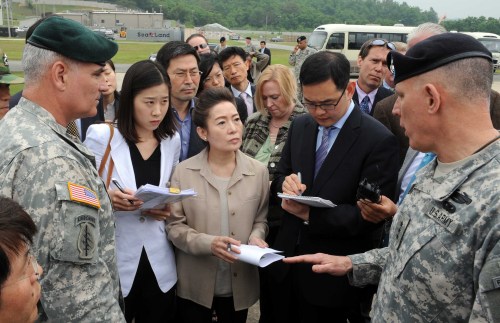Ministry to begin health survey of residents living near U.S. base
South Korean and U.S. officials agreed to use ground-penetrating radars, and underground water analysis within a southern U.S. army base to help verify whether a toxic defoliant was buried there nearly three decades ago, officials said Wednesday.
The results of their meeting Wednesday were announced during a briefing at Camp Carroll in Waegwan, North Gyeongsang Province, by David Fox, brigadier general of Installation Management Command Korea, which was attended by Environment Minister Yoo Young-sook.
Fox said the investigation will begin Thursday starting with area D and an area near the helipad in Camp Carroll, which was pointed out by whistleblower Steve House, who started the string of allegations through an interview with a U.S. news agency.
South Korean and U.S. officials agreed to use ground-penetrating radars, and underground water analysis within a southern U.S. army base to help verify whether a toxic defoliant was buried there nearly three decades ago, officials said Wednesday.
The results of their meeting Wednesday were announced during a briefing at Camp Carroll in Waegwan, North Gyeongsang Province, by David Fox, brigadier general of Installation Management Command Korea, which was attended by Environment Minister Yoo Young-sook.
Fox said the investigation will begin Thursday starting with area D and an area near the helipad in Camp Carroll, which was pointed out by whistleblower Steve House, who started the string of allegations through an interview with a U.S. news agency.

“Ground radars can measure the density of the soil in an area, which can confirm if a ditch has been dug in an area,” he said.
“I ask that you keep your word that the No.1 priority in the investigation is the safety of the surrounding citizens, your soldiers and their families,” said Minister You.
The Defense Ministry’s task force will also launch a full-scale environmental inspection of all 85 former U.S. bases, which Washington returned to Seoul between 1990 and 2003 without conducting environmental surveys. The inspection at Camp Mercer was scheduled to start Thursday, but was delayed due to weather conditions. According to officials, they will wait until the rain has stopped and ground has dried.
The investigation at the former U.S. military installation is expected to take as long as two months and will serve as a guideline for the other bases.
The probe team at Camp Mercer, currently occupied by an engineer unit under Korean Army’s Capital Corps, consists of military and government officials, and experts.
The Environment Ministry also announced that they will begin a health survey of the citizens living in the vicinity of Camp Carroll to study how people may be affected by drinking water from the underground system.
Ministry officials said they will conduct urine and blood analyses once more information of toxic chemical burials is found.
Meanwhile the probe team has already sent underground water samples gathered at 10 points near the camp on Tuesday to several local universities, including Pohang University of Science and Technology, for analysis. The result is likely to arrive this weekend, officials said.
Some here have also clamored for the revision of the SOFA to modify its environmental rules and hold the U.S. strictly responsible for its military’s possible environmental pollution here.
Meanwhile, controversy has continued when the U.S. sprayed toxic herbicides in South Korea with the revelation of a set of conflicting U.S. government records.
Both Seoul and Washington governments have said that the U.S. military had sprayed defoliants south of the Demilitarized Zone, the buffer zone dividing the two Koreas, from 1968-69 to more easily detect North Korean infiltrations into the South.
However U.S. Department of Veteran Affairs documents state that Agent Orange, Agent Blue and Monuron were used in Korea from 1962-1970, and a former Korean soldier said the U.S. used defoliants in the mid-1950s.
By Robert Lee (robert@heraldcorp.com)








![[Kim Seong-kon] Democracy and the future of South Korea](http://res.heraldm.com/phpwas/restmb_idxmake.php?idx=644&simg=/content/image/2024/04/16/20240416050802_0.jpg&u=)







![[KH Explains] Hyundai's full hybrid edge to pay off amid slow transition to pure EVs](http://res.heraldm.com/phpwas/restmb_idxmake.php?idx=652&simg=/content/image/2024/04/18/20240418050645_0.jpg&u=20240418181020)

![[Today’s K-pop] Zico drops snippet of collaboration with Jennie](http://res.heraldm.com/phpwas/restmb_idxmake.php?idx=642&simg=/content/image/2024/04/18/20240418050702_0.jpg&u=)